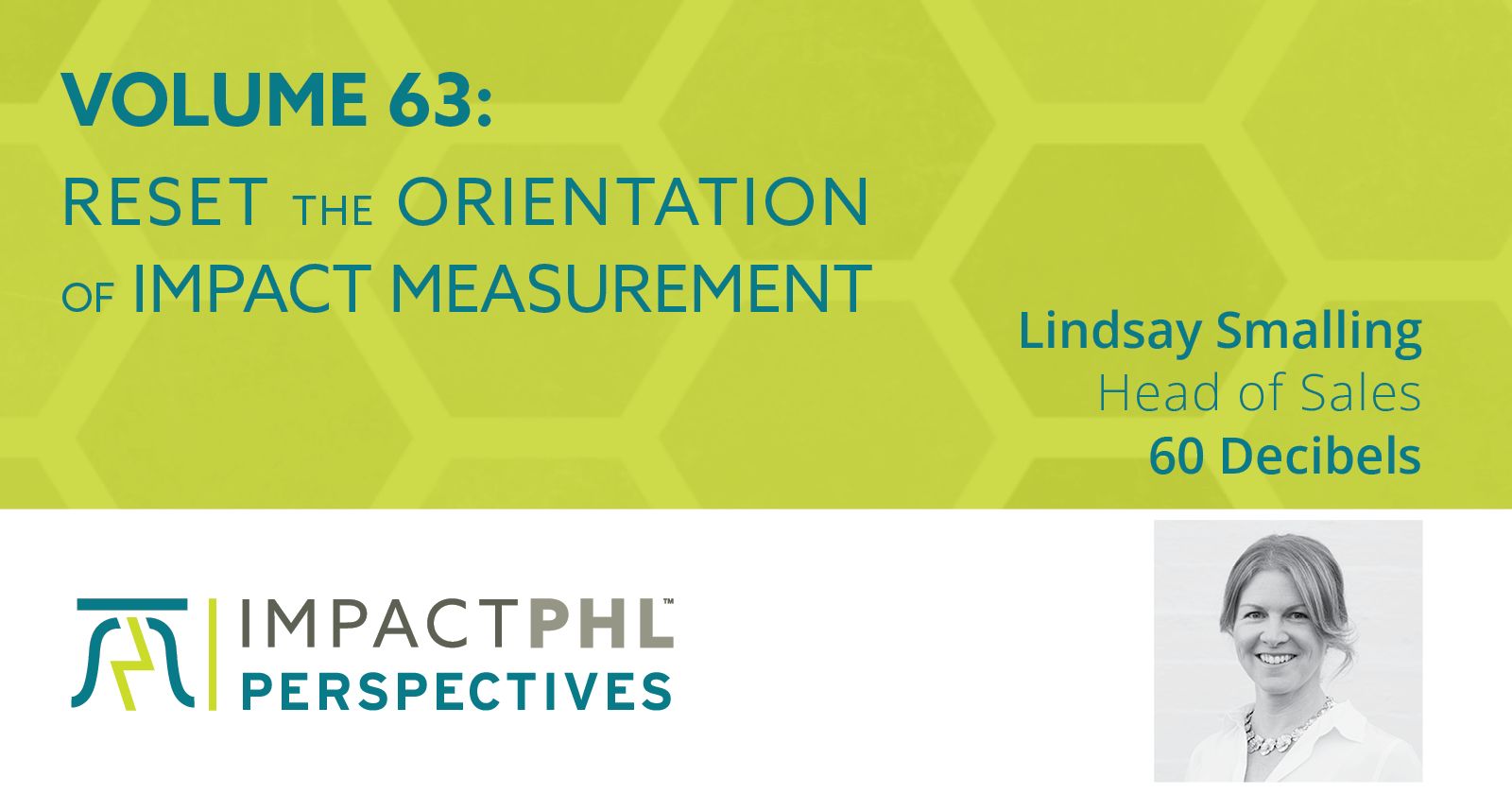
Reset the Orientation of Impact Measurement
by Lindsay Smalling, Head of Sales at 60 Decibels
This article was originally published on ImpactPHL’s website here. Lindsay will be speaking at their Total Impact Summit on May 1st & 2nd 2023. Interested? Register here.
At Total Impact, the conversation will range from hyper-local to global, and investors will share examples of impact across asset classes. The creativity and momentum of market-based solutions are what drew me into impact investing in 2010, and what fascinated me as I curated SOCAP through 2019. However, in my peripheral vision, in that space where once you look at something clearly, you wonder how you didn’t see it before, I was bothered by impact measurement. It was a low-level irritation: articles and conference sessions on impact measurement advocated for certain frameworks and tools, but real insights on what worked or didn’t and whether people’s lives were improving all seemed elusive. When the doubters and critics came calling – which they always have and increasingly do as impact AUM increases – I couldn’t shake the feeling that impact investing was missing essential data from the people who matter most – those who are experiencing the impact.
Flash forward to today, and I feel much more optimistic. I now head up sales at 60 Decibels, where last year we listened to 171,000 people across 64 countries, picking up the phone and having conversations about the impacts of financial inclusion, off-grid energy, agricultural tools and inputs, job quality, and more. We speak to stakeholders and ask what matters most to them. By doing this work at an enormous scale, we generate rigorous benchmarks for understanding impact performance.
“For impact measurement to serve its highest purpose, the starting intention should be gathering data that serves to improve impact rather than to prove impact.”
This work exists within the broader evolution of impact management. There has been major progress in the underlying scaffolding for meaningful impact measurement, including the Impact Management Project’s five dimensions of impact, which clarified what to measure, and the Impact Principles established by the IFC, which set a standard for what investors need to do – and have independently verified – to call themselves impact investors. These efforts are raising the standard of practice and calling for documented outcomes, and in this way, they represent a growing consensus that we need more and better impact data. However, I believe that we also need a more fundamental reorientation of impact measurement, one that focuses our collective efforts on the most meaningful data.
For impact measurement to serve its highest purpose, the starting intention should be gathering data that serves to improve impact rather than to prove impact. In the end, the right metrics can do both, but the problem with orienting towards impact metrics that look good on a website, impact report, or update to funders is that it puts the emphasis on proving or supporting the impact thesis. The confirmation bias in that approach limits the ability to learn and improve. This often leads to bold impact claims that are reached by applying generous assumptions or favorable proxies to basic operational data. Triangulation from outputs to outcomes does not provide new insights to inform impact management and actually obscures our understanding of the strengths in varying approaches.
Too often, impact measurement is a post facto marketing or compliance effort that is not integrated into how a social enterprise or fund makes decisions. This results in impact measurement often being experienced as a burden or a distraction, despite general consensus that it’s necessary. However, the value and relevance of impact data comes to life – for every stakeholder from customers to enterprises, fund managers, and asset owners – when the orientation shifts to gathering data that will inform and improve impact.
At 60 Decibels, we start with asking an enterprise what they want to know and designing phone surveys that enable customers to share their experience and feedback in their own words. This seems straightforward but is not standard practice, which leaves valuable insight on the table.
“Focusing impact metrics on improving impact also creates a shift in power: away from external validation and towards deeper engagement with communities. ”
For example, we’ve been working with regional COVID recovery loan funds, speaking directly with small business borrowers to understand who was reached through these loan funds and what was the impact of receiving the loan. Impressive data was already available about the dollars deployed, the number of loans made, and initial demographic data gathered in the loan application, but what the investors and CDFIs involved in the loan fund really wanted to know was whether the capital reached underserved businesses and did it help those businesses to survive and recover post-COVID. The results from surveys with nearly 600 borrowers of the NY Forward and CA Rebuilding loan funds confirmed that the loans responded to an unmet need: more than 40% of borrowers had not accessed a prior business loan, and more than 60% did not believe they had access to a good alternative. Business owners reported an increased ability to manage finances and maintain jobs and decreased stress levels. This data was collected not just to prove that the loan funds had an impact but also to improve future loan products by hearing from borrowers about what made this experience different, what worked well, and what they are still struggling with.
Focusing impact metrics on improving impact also creates a shift in power: away from external validation and towards deeper engagement with communities. It centers the lived experience of people who experience the impact, and it puts ventures at the helm of determining which data is actionable and relevant to the stage of their business for making decisions to improve impact performance. Investors benefit from this shift, as well: impact measurement reoriented around improvement is data for learning, supporting the growth and sustainability of portfolio companies, and providing valuable insights to inform investment decisions.
At a personal and field level, this reframing of impact measurement is as simple as a call to curiosity, an invitation to explore how we can use data to expand and deepen impact. If my experience of low-level irritation with impact measurement resonates, I would guess that the metrics you are gathering or are being asked to report on aren’t really telling you what you want to know. Listen to that curiosity and think about what information might be sitting just beyond what you know today, and let’s reset our focus on impact measurement that listens to the people who matter most, makes us all smarter about what’s working, and drives improved impact performance.

Lindsay Smalling is the Head of Sales at 60 Decibels, a tech-enabled impact measurement company using (mostly) phone-based surveys to listen better to end customers and beneficiaries around the world. Prior to 60 Decibels, she was CEO of SOCAP, convening social entrepreneurs, impact investors, and cross-sector leaders through world-renowned events at the intersection of money and meaning. Lindsay was previously Strategic Initiatives Officer at ImpactAssets, consulted on corporate social responsibility programs at Entrepreneurs Foundation, and started her career in financial services at Wellington Management and Lord Abbett. Lindsay graduated from Pomona College, where she was a Division III National Champion in water polo, and has an MBA from Columbia Business School. She lives in San Francisco with her husband and twin daughters.